Benelli India To Double sales In 2021 With New Products
- By Sharad Matade and Venkatesh Koushik
- February 24, 2021
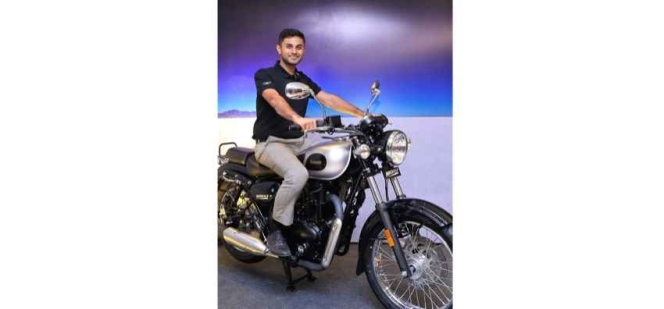
Q: India’s two-wheeler market is highly competitive and dominated by commuter two-wheelers. How will Benelli field its products?
Jhabakh: The Indian two-wheeler market is the largest in the world as we speak. Barring the slowdown in the last one year, it is one of the growing markets at a high pace. So, I believe once we get through the tough period, we will go back to the heyday’s growth numbers.
Definitely, when the market size is big and so much at stake, one can expect a lot of competition around, which is what we see in India. Earlier the Indian two-wheeler market was completely dominated by commuter bikes, but in recent years, we are witnessing the emergence of the premium and mid-premium segments. Though the numbers are small, the segments are growing very strongly over the last few years.
Our products and services bring a different value proposition to the Indian market. Benelli is a fairly young brand in India compared to our peers, but we are confident about our products. We are currently offering products in the range between 250cc to 600cc, which is just above the commuter segment that is the150-200cc space. With our current product portfolio, we cater to different customers from the cruising, adventure, sports segments and more. So that way, we have a lot of depth in our portfolio and focus on value for money products.
Q: What consumer-centric initiatives are you planning to introduce to support the user’s requirement and enhance Benelli’s brand image?
Jhabakh: Benelli has been in India for the last two years only and sold over 5,000 units. As of now, we 35 dealers across the country. In that sense, we have been picking up a lot of recognition and becoming one of India’s fastest-growing brands.
We aim at continuing the growth with the launch of new products in 2021. The company will also increase our dealership network and retail presence across the country. The company targets to have 60 outlets by March and, from there on, we will be adding approximately two dealers every month in our network. So, the intention is to continue growing organically. With this, the brand will reach to more people and geographics increasing the overall awareness.
Apart from this, Benelli will also be focusing on riding activities to enhance brand awareness. Going forward, based on how situation permits, we have aggressive plans for different types of riding activities such as day, night and weeklong rides.

Q: How is Benelli managing the spare part supplies as many companies face issues on importing parts, especially from China?
Jhabakh: Benelli imports spare parts from multiple countries and locally. Of course, due to lockdown, there was a little bit of concern on the supply chain side.
When we started two years ago, we did not have a single local supplier. Today, we have around 20-25 local suppliers and are currently in talks with many suppliers. We aim to increase the local content in our products and reduce dependency on imports without compromising quality.
Q: What are the plans for localisation? What upgrades are expected in the production lines to increase the production capacity?
Jhabakh: Localising the content and getting Indian suppliers on board have always been our aim as it also safeguards us from global shocks, like the one we just faced. We are already working with about over 20 suppliers in India, primarily for the Imperiale 400, because that is the product which has the maximum volume for us in our portfolio.
We were in the discussions with many suppliers, but we had to halt the talks due to the lockdown. When we procure certain safety products, like brakes, abs, the process of testing can take as long as nine months to one year and requires extensive testing before we can change to a new supplier.
On investments and up-gradation, we utilised the lockdown period to upgrade our capacity at the plant. We now have a capacity of 30,000 units a year.
Q: In India, dealers make less than one percent profit in the business. How are you taking new dealers onboard and on which cities Benelli will focus?
Jhabakh: Benelli takes dealerships and their profitability very seriously. We keep a good balance between the investments that somebody makes into the business and returns. We have been through the closure of four to five months and still managed to hold on to all the dealers in our network. In fact, we have added dealers to our network through digital launches. So, people continued to showcase their confidence towards the brand, the products, and the company’s future strategy.
We will expand on pan India for the dealership, having a major focus on the north and west India. We already have a good presence in the south in terms of dealerships.
Q: Common issue plaguing the premium two-wheeler industry is service reliability. How does the company plan on winning customer confidence with service?
Jhabakh: We also don’t want our customers to face after-sales or service issues. If you buy an Imperiale today, you get a three-year warranty along with two years of free service. Apart from that, we have roadside assistance, AMC and pick and drop facilities. We also keep a smooth supply of service products focusing on our customers’ after-sales experience, so that at any given point of time, they do not have to worry about a part failure.
Since our bikes are specialised, it requires specialised training to service them. We have an internal training programme and a training facility that train all our dealership staff, especially for new dealerships or new products. In fact, during the lockdown, we converted all our training into e-training modules. We have created video modules which have helped us to save time and money.
We also have a concept called the Flying Doctor, where if a dealership is facing a problem which is not getting resolved for two or three days by the dealership staff, then highly technically trained personnel will be deployed to the dealership to resolve the problem. We are also now coming up with DIY videos and DIY sessions at our dealerships across the country where we invite customers to come down and learn how to do basic maintenance on their bike and share tips to improve the bike’s life the ride quality.
 Q: At present, Benelli has only one model Imperiale 400 complying with BS-VI emission norms. Tell us about your plans to upgrade the other models to the new norms?
Q: At present, Benelli has only one model Imperiale 400 complying with BS-VI emission norms. Tell us about your plans to upgrade the other models to the new norms?
Jhabakh: Initially, the plan was to launch the BS-VI Imperiale in April 2020 and just before the festival, we wanted to upgrade the rest of the portfolio. But we had to shelve our plans due to COVID. We were able to introduce the BS-VI bike only in August post which we did not want to bring in any other bikes towards the end of the year. So that’s why we decided, from January 2021, we will start launching the rest of our BS-VI portfolio. Between January and August, we will be launching five to six new models in BS-VI. Initially, we plan to bring back the 500cc category. So, you will have the TRK and Leoncino come back, after that we will move on to the sub 500cc category.
We are planning to expand our 250cc portfolios. We launched the Leoncino 250 last year and strongly consider bringing other variants in the 250cc range.
Q: Would you be introducing electric bikes in India? Elaborate.
Jhabakh: Benelli, as part of the global portfolio, has e-bikes in certain countries. We have been closely monitoring the e-bike market in India. I think the Government of India has also been putting a very strong push for e-bikes in India. So, in 2021 we will focus on reintroducing our BS-VI portfolio and based on how the e-bike market develops and matures, we will plan for it later.
Q: How important is digitalisation for Benelli?
Jhabakh: Digitalisation has always been important. All the companies are moving towards being more digital, and the pandemic has only uplifted the pace for digitalisation. The entire buying experience has a couple of steps. At first, people do their research on the products, prices, finance and comparisons online. We have been investing a lot of our time and money in the digitalisation. We are trying to make information available to consumers on platforms that they are accessing. In fact, when we had launched the Imperiale 400, we made bookings available online.
In the second step, customers want to complete the transaction in an offline mode where they would like to come down to the store and get a feel of the bike, brand and environment before making the final decision and that is where our dealer network becomes very important. I do not see the entire buying process moving digitally, but a large part of the information process that goes into the buying decision will definitely move to digital. We will keep enhancing connected technologies in our products.
Q: Do you have any plans to set up a manufacturing facility?
Jhabakh: To have a manufacturing facility, it requires large investment and sales numbers for it to be viable. In 2019, we grew 100 percent compared to a year ago. Despite the lockdowns, we clocked a growth in 2020. For 2021, we target to grow by 100 percent. So, our idea is to continue improving sales numbers with the increasing level of the localised content. Once we reach a certain number sales per month, then there is viability to have a manufacturing plant.
Q: With complete localisation, by how much do you expect the overall price to come down?
Jhabakh: It is a difficult question to answer because localisation happens over time. Localisation needs investments and it is not about just replacing an outsider supplier with a local one. So, the answer is not that straightforward that the price will drop by this percentage. Localisation and price drop go hand in hand. The more you localise, the more the price will come down.
Q: What are the challenges in the business?
Jhabakh: I think more of the recent challenges have been with the lockdown and the lockdown’s subsequent opening. We import parts from many countries globally and because of the different rules in each country and states within the country, there has been a huge disruption in the global supply chain.
Also, the global restart has not been very kind. Freight expenses have shot up through the roof and the container availability has become very difficult. Parts that were taking 25 to 30 days transit time are now taking 45 to 60 days of transit time. But we see this as restarting issue and every week it is getting slightly better. We are hoping that maybe by February or March the market should stabilise. Also, after the festival season, many people have started buying again, be it bikes or cars or electronics or cloths. So, consumer spending capability is now slowly beginning to come back. If we continue in this format, and if there are no more shocks in the market, I think many of these challenges will go away. (MT)
Classic Legends Secures New Patent For Rider Interface Innovation
- By MT Bureau
- January 15, 2026
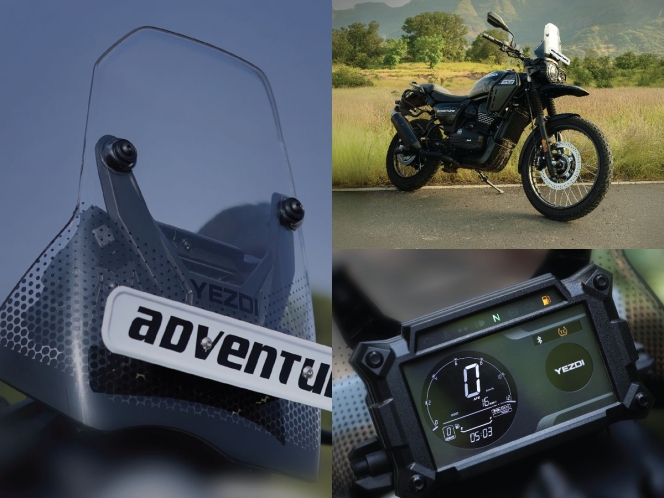
Classic Legends, one of the leading mid-sized motorcycle manufacturers, has been granted a patent for an adjustable visor and speedometer system. The patent, initially featured on the 2025 Yezdi Adventure, is valid for 20 years from 21 March 2023. This mechanical innovation allows riders to modify the height and position of the interface to suit their stature and comfort during road or off-road use.
The company has developed a portfolio of intellectual property, including a previous patent for an Airfilter Multifrequency Resonator used in its 650cc models, such as the BSA Gold Star. Unlike standard resonators that target a single frequency, this technology dampens air-filter noise across the engine's entire revolution range. Classic Legends also introduced the Alpha 2 liquid-cooled 334cc engine, which focuses on thermal efficiency and performance within the mid-capacity segment.
The OEM’s approach focuses on ergonomics and mechanical function. On the 2025 Yezdi Adventure, a centrally routed exhaust is used to manage heat and improve comfort, while twin headlamps are employed for illumination width. For the 2025 Yezdi Roadster, design decisions regarding chassis geometry and mounting strategies allow for adjustable seating and specific riding triangles.
Susheel Sinha, Head – R&D, Classic Legends, said, “This patent may solve a specific rider-interface problem, but it represents how we think about motorcycles. At Classic Legends, performance engineering is not about feature accumulation. It has to bring mechanical clarity and durability to how a motorcycle feels over years of use. It is the same with design decisions that start with the rider and the road. The recognition is fresh encouragement for us to keep building rider-centric motorcycles with a strong engineering foundation.”
Classic Legends continues to invest in in-house R&D and engineering talent, resulting in two granted patents and two pending filings. The company manufactures the 650cc engine for the BSA Gold Star, which is among the largest single-cylinder engines in production in India. Its product range has previously introduced technologies to the mid-sized category including six-speed gearboxes, traction control, and assist and slipper clutches.
Suzuki Gixxer Range Gets New Colours And Graphics Options
- By MT Bureau
- January 15, 2026
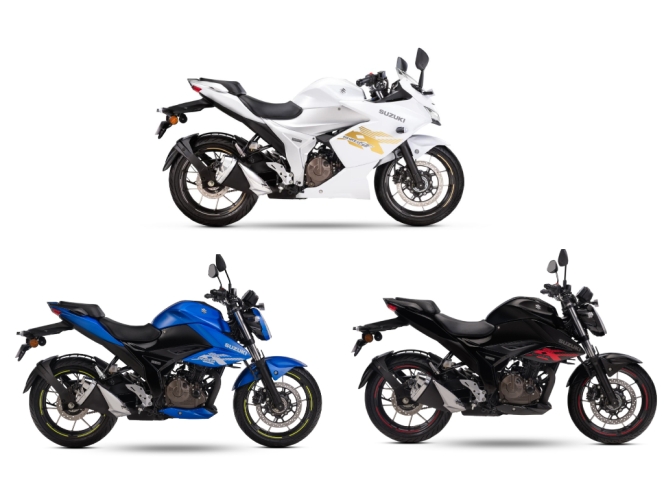
Suzuki Motorcycle India (SMIPL) has introduced new colours and refreshed graphics for its Gixxer SF 250 and Gixxer 250 motorcycle range.
The Gixxer SF 250 is now available in Glass Sparkle Black and Pearl Glacier White/Metallic Mat Platinum Silver No.2, alongside the existing Metallic Triton Blue/Pearl Glacier White. On the other hand, the Gixxer 250 offers three choices: Pearl Glacier White/Metallic Mat Platinum Silver No.2, Metallic Triton Blue/Glass Sparkle Black, and Glass Sparkle Black.
Both motorcycles are powered by a 250cc single-cylinder engine with a Single Overhead Camshaft design, producing 26.5 Ps at 9,300rpm and 22.2 Nm at 7,300rpm. The engine utilises Suzuki Eco Performance (SEP) technology and the Suzuki Oil Cooling System (SOCS) to balance acceleration with fuel consumption and maintenance. The bikes feature a chassis designed for stability, LED lighting and a digital instrument console with Bluetooth connectivity.
The Gixxer SF 250 is priced at INR 189,768 (ex-showroom Delhi), with ownership benefits including insurance savings and warranty benefits valued at up to INR 12,000. The Gixxer 250 is available for INR 181,517 (ex-showroom Delhi), offering similar benefits up to INR 10,000. Finance options are available with interest rates starting from 7.99 percent. Additionally, the GIXXER SF 250 is offered in a flex-fuel variant compliant with E-85 standards.
Deepak Mutreja, Vice-President – Sales & Marketing, Suzuki Motorcycle India, said, "With the latest colour palette and graphics, the GIXXER SF 250 and GIXXER 250 gain a striking visual appeal that enhances their sporty character. These motorcycles seamlessly combine performance and advanced engineering, catering to riders who seek a sporty yet comfortable riding experience".
Suzuki Motorcycle continues to promote the range through its Gixxer Pit Stop initiative across India, which includes test rides, maintenance sessions and exchange opportunities. The Gixxer SF 250 recently set a record by covering 3,259 kilometres in 24 hours. The company operates from its manufacturing plant in Gurugram, which has a production capacity of 1.3 million units per year.
- Ducati India
- Bipul Chandra
- Desmo450 MX
- New Multistrada V4 Rally (2026 Edition)
- Panigale V4 Lamborghini
- Panigale V4 Marquez Replica
- Panigale V2 Special Edition MM93
- Panigale V2 Special Edition PB63
- New Monster V2
- Diavel V4 RS
- Hypermotrad V2/V2 SP
- Panigale V4R
Ducati To Launch 10 New Models In India In 2026
- By MT Bureau
- January 13, 2026
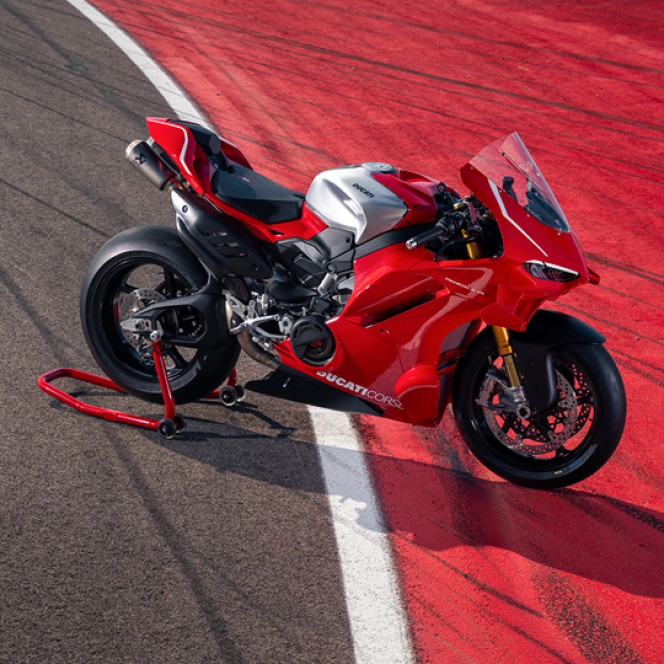
Italian superbike maker Ducati India has revealed its aggressive product roadmap for 2026, confirming the introduction of 10 new and updated motorcycles to the Indian market.
The announcement includes plans to expand the brand's dealer touchpoints to improve accessibility and service for its customer base.
The 2026 portfolio comprises the Desmo450 MX, New Multistrada V4 Rally (2026 Edition), Panigale V4 Lamborghini, Panigale V4 Marquez Replica, Panigale V2 Special Edition MM93, Panigale V2 Special Edition PB63, New Monster V2, Diavel V4 RS and the New Hypermotard V2/V2 SP. These follow the Panigale V4R, which was launched in India on 2 January 2026.
The launch schedule begins in the first quarter of 2026 with the Multistrada V4 Rally, the Panigale V4 Lamborghini, and the Desmo450 MX. The third quarter will see the arrival of the New Monster V2 and the Marc Márquez and Pecco Bagnaia Special Editions of the Panigale V2, followed by the Diavel V4 RS. The final quarter of the year will feature the Hypermotard V2 range in October, concluding with the Panigale V4 Marc Márquez Replica in December.
Bipul Chandra, Managing Director, Ducati India, said, “2026 is poised to be another landmark year for Ducati as we continue to push boundaries with a portfolio of new launches that will set fresh benchmarks in the premium motorcycle segment. Our commitment to delivering the most sophisticated, performance-driven motorcycles to Indian customers has never been stronger. We are excited to introduce these exceptional new models, and with the expansion of our dealership network, we look forward to a successful and impactful year for Ducati in India.”
Ducati will open bookings at its dealerships in Delhi, Mumbai, Pune, Bengaluru, Chennai, Hyderabad, Kochi, and Kolkata. Indicative pricing for the upcoming range will be released on the company's website ahead of the specific launch dates.
- Suzuki Motorcycle India
- Greaves Finance
- Suzuki e-Access
- SMIPLE
- ev.fin
- Deepak Mutreja
- P B Sunil Kumar
Suzuki Motorcycle India And Greaves Finance Partner To Launch EV Financing For e-Access
- By MT Bureau
- January 13, 2026
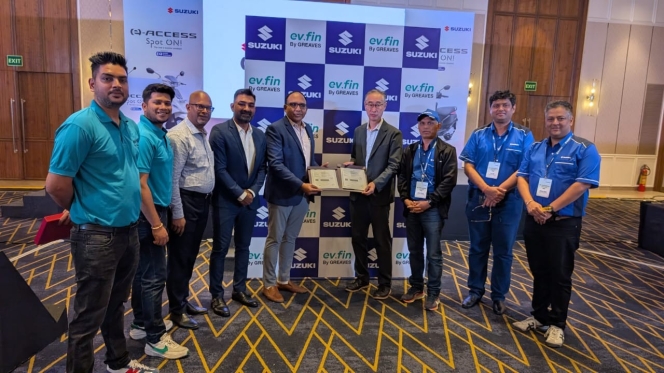
Suzuki Motorcycle India (SMIPL) has announced a partnership with Greaves Finance, operating under the brand ev.fin, to provide financial solutions for the Suzuki e-Access electric scooter. The collaboration introduces buy-back upgrade assurances and retail finance options intended to lower the barriers to electric vehicle ownership.
The partnership combines SMIPL’s dealership network with the digital financial platform of ev.fin. The primary objective of the association is to provide customers with predictable resale values and credit support at the point of purchase.
To address concerns regarding the resale value of electric two-wheelers, SMIPL and ev.fin have introduced a structured buy-back programme. Customers can select from two primary plans: a 36-month term offering up to 60 percent of the ex-showroom value, or a 48-month term offering up to 50 percent of the effective ex-showroom price. This programme is designed to provide a guaranteed value for users looking to upgrade their vehicles in the future.
The ev.fin platform offers retail finance solutions including loans for up to 100 percent of the vehicle cost. Interest rates for the Suzuki e-Access start from 5.99 percent, with monthly instalments beginning at INR 3,999. The loan process is managed through a digital journey aimed at reducing processing times and offering customisable plans, such as low-down payment options.
Deepak Mutreja, Vice-President, Sales & Marketing, Suzuki Motorcycle India, said, “At Suzuki Motorcycle India, we continually look for ways to make the ownership journey easier and more reassuring for our customers. Through our association with Greaves Finance, we are introducing added value at both the purchase and resale stages of the Suzuki e-Access. With the assured buyback upgrade and tailored finance options, we bring more trust and peace of mind to EV ownership, while enhancing customer accessibility to electric two-wheelers.”
P B Sunil Kumar, Executive Director & CEO, Greaves Finance, said, “We are delighted to partner with Suzuki Motorcycle India to accelerate the transition to electric mobility. By offering Buyback upgrade options and customized financing through our ev.fin platform, we are eliminating the 'resale anxiety' often associated with EVs. Our goal is to provide a seamless, digital-first financial experience that makes the Suzuki e-Access an even more compelling choice for the Indian commuter.”







Comments (0)
ADD COMMENT